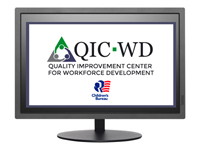Child Welfare Quality Improvement Center for Workforce Development (QIC-WD)
Date of this Version
2019
Document Type
Article
Citation
Peer Support Guide: Building Resilience in the Child Welfare Workforce [A Supplement to Resilience Alliance]. Lincoln, NE: Quality Improvement Center for Workforce Development, 2019.
Abstract
This guide is intended for CFSS workers or supervisors facilitating a Peer Support Group (PSG) session. The PSG is part of CFS Strong, beginning in January 2020. CFS Strong is designed to address the cumulative effects of secondary traumatic stress (STS) that is part of the day-to-day work of CFSS. CFS Strong includes: (1) an adaptation of Resilience Alliance (RA) to teach skills and strategies to manage STS and build team cohesion, (2) Restoring Resiliency Response (RRR) to allow workers to debrief after an acute traumatic event, and (3) PSGs to reinforce the skills taught in RA and provide a positive peer group for CFSS to feel supported in their work. The PSG include the same team members who participated in the RA group (typically 2 supervisory units totaling 10-15 CFSS and supervisors).
The PSGs meet no less than once a month for 60 – 90 minutes for the six months following RA. Meetings are encouraged to be face-to-face but may be held via skype or zoom in rural locations where driving to meetings is burdensome. Each group will determine their plan for how often, how long, and where they will meet. The PSG will select its own facilitator(s). The peer facilitator will be selected by the group prior to each PSG meeting. One person can lead one or multiple PSG sessions.
This guide provides an outline and suggested activities for each PSG session; leaders can supplement this guide with their own activities and are encouraged to be creative and plan engaging sessions. There are six modules in this guide. If the group decides to meet more frequently than once/month they can use the additional activities in the guide or add their own activities. The guide is modeled after the RA sessions and reinforces the six core components of RA: Optimism, Collaboration, Self-Care, Mastery, Self-Reflection, and Self-Awareness. This document includes an outline for each session (in green), references to RA materials (in red with references to the RA facilitator manual), and ideas for activities (in purple). The CFS Strong budget includes $25/month for the purchase of supplies and/or snacks. The peer facilitator is responsible for:
- Securing meeting space and notify the team via meeting invitation (copy Sharon Kruse)
- Organizing the procurement of supplies and/or snacks ($25 limit, following local guidance on purchasing and reimbursement or P-card process) 3
- Planning the session including making copies of hand outs, activities, or other materials for the session
- Facilitating the session
- Reporting attendance (see Appendix 2 for sign in sheet, and email to Kate Stephenson kstephenson@unl.edu)
- Completing the peer facilitator survey and reminding participants to complete the participant survey (see Appendix 3 for participant questions).
What does it mean to be a facilitator? Your peers are the experts, but you, as a peer facilitator, are there to help guide the conversation and engage everyone in the group. Spend a few minutes reviewing the expectations for the session and what everyone has agreed to such as confidentiality, phone use, respectful listening, positivity, respecting the time we’re together, and not venting. This guide is intended to structure your session and provide ideas, topics for discussion, and activities. Talk about relevant topics but keep the discussion positive and constructive.
This guide was developed by the Nebraska Workforce Project Team’s (the implementation team guiding CFS Strong) Content Workgroup through its collaboration with the Quality Improvement Center for Workforce Development (QIC-WD). The QIC-WD is funded by the Children’s Bureau and does not necessary reflect their views.
Included in
Industrial and Organizational Psychology Commons, Performance Management Commons, Public Policy Commons, Social Welfare Commons, Social Work Commons, Training and Development Commons


